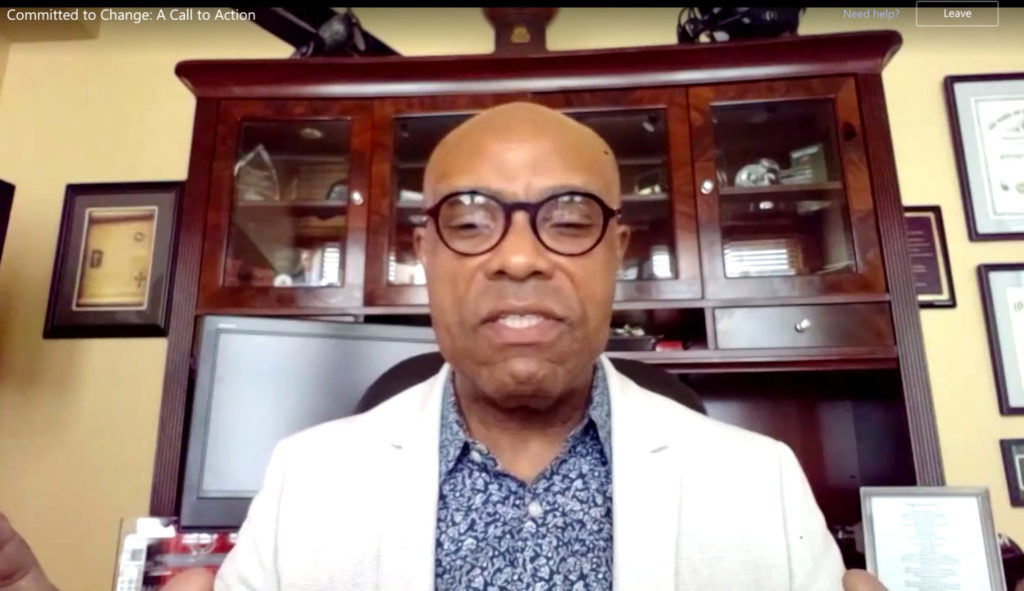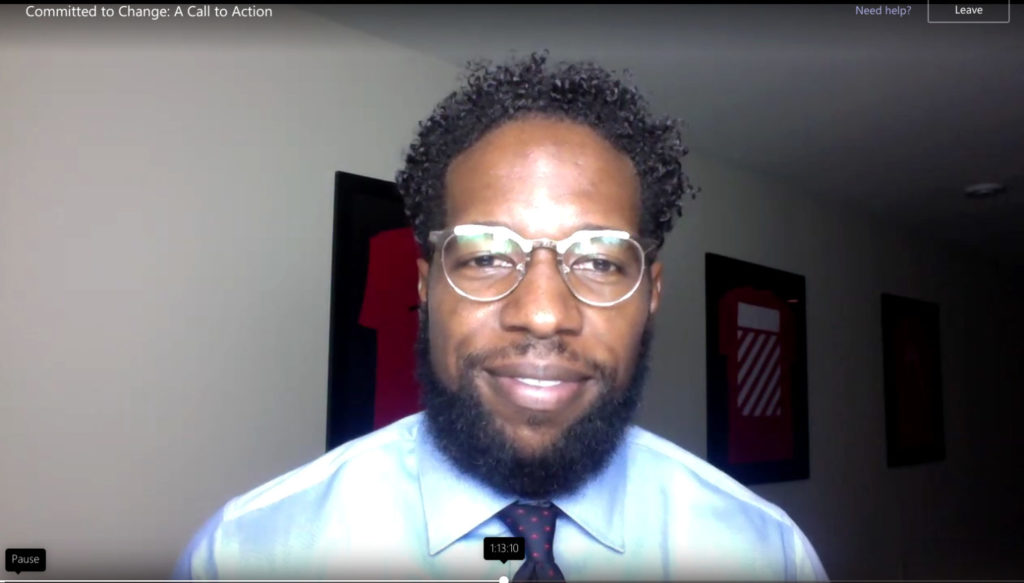
Over 1,800 participants joined the University of Wisconsin-Madison’s virtual panel discussion dedicated to understanding how racism impacts students and alumni engagement in an event titled “Committed to Change: A Call to Action, Understanding How Racism Shows Up and Impacts Students and Alumni Engagement.”
The event was hosted by UW’s Division of Diversity, Equity & Educational Achievement (DDEEA), which works to create a diverse, inclusive and excellent learning and work environment for all students, faculty, staff, alumni and partners at the university.
A variety of speakers discussed the complex dynamics of racism and how it shows up on predominantly white campuses while recommending ways campus stakeholders approach students and alumni impacted by racism with empathy, intention and justice.
Grady Crosby, vice president of public affairs and chief diversity officer of Milwaukee-based Johnson Controls, served as host and moderator of the event. Crosby is also an Equity Diversity Council member for the Division of Diversity, Equity & Educational Achievement.
“I think we’re going to find that even though the time we have today may seem short, when we look at all of the things that we want to address there are so many facets here as we talk about our commitment to change and a call to action,” Crosby says. “The health pandemic of 2020 that we’ve experienced seemed to unmask and present more vividly some disparities and some inequalities that are going on in our community – perhaps things that we always knew.”

Crosby went on to talk about the murder of George Floyd in Minneapolis and the protests that would follow and the impact it has had on the nation.
“It seemed like what happened with George Floyd was one of those incidents that galvanized people to take it to the streets and galvanized people to make some sort of change,” Crosby said. “That’s what we want to discuss here today: What are the commitments to change that the nation seems to be screaming for and what are the particular calls to actions that people can do to address the racial and social inequality that we are facing?”
“Committed to Change: A Call to Action” hosted three panels featuring a broad cross-section of UW alumni, experts on racism, campus and community leaders and elected officials who shared the long-term history and roots of racism, especially in the Midwest. The panel included national experts on racism like Shawn Doe, founder and CEO of Campaign for Black Male Achievement, and Dr. Pamela Newkirk, professor of journalism at NYU and author of “Diversity, Inc. The Failed Promise of a Billion-Dollar Business.”

“If we are to reimagine a more just and inclusive nation, higher education must play a central role for it is where pernicious theories of racial hierarchies were constructed, legitimized, and disseminated and have never been sufficiently dismantled,” Newkirk said. “Notions of racial inferiority and superiority resonate still.
“Our refusal as a nation to confront – until now – the truth of race and injustice and a deeply-rooted ideology of white preeminence has left many ill-equipped to understand, let alone tackle, enduring inequities and it’s part of the reason why even with decades of pledges, multi-billion-dollar diversity initiatives and far more diverse candidate pools, we have failed to realize racially diverse workplaces,” she added.
The panel also included student and alumni perspectives from Cavalier Johnson, City of Milwaukee Common Council president; Payton Wade, founder of the Student Inclusion Committee of UW-Madison and Darrell Hines, CEO of Hines Consulting. Hines said that it was a wonderful opportunity to be having this conversation on racism.
“I firmly believe that conversations can be very productive in reaching a common goal. Constructive conversations can really help in bridging the gap of understanding,” Hines said. “My hope is that this is an opportunity to educate and enlighten one another and as we begin to learn more about the conditions of the Black experience on campus, it will further ring the alarm for the ned of tremendous progress.
“We have to move the needle of change,” he added.

Hines talked about a book he wrote titled “Memoirs of a black man on a white campus.”
“The challenges that we face on UW’s campus have been established over a long period of time which lets us know that the necessary changes won’t happen overnight,” Hines said. “But we also know that if we start today, we can begin creating a better environment for the next generation.
“In spite of the challenges, I am still an advocate for UW. I love being a Badger. I wear my Badger badge very proudly. The wonderful part about receiving an education at UW is that it opens the doors of opportunity across the globe,” he added. “I have three children and I would love for them to attend UW, but I think it is important that I do my part so that they and other Black children have a UW experience that is free of prejudice and racial injustice.”
Campus and community leadership perspectives were also shared by Dr. Ruben Anthony, president and CEO of the Urban League of Greater Madison; Claudia Marter, mental health provider for Students of Color Focus at UW-Madison; Dr. Corey Steele, psychologist and mental health provider for Students of Color Focus at UW-Madison; and Dr. Eric Wilcots, the new dean of the College of Letters and Science and Mary C. Jacoby Professor of Astronomy at UW-Madison.

Dr. Wilcots said that we have to make sure that all students are made to feel welcome and that they can be successful.
“Personally, I believe that part of this starts at the local level and we need to work with our departments and our units to make sure that they are doing everything they need to be doing to welcome all students and bringing students in to be successful,” he said.
“We are a research 1 institution. We have a lot of really smart people on this campus who are working on and are thought leaders on subjects that we have touched on and raised this morning that are at the forefront of our minds,” Wilcots added. “We have to empower those individuals to turn that research into policy action that we can affect change more broadly.”



